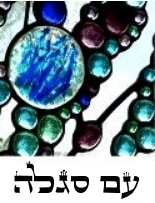“The kingdom of heaven is like treasure hidden in a field, which a man found and covered up. Then in his joy he goes and sells all that he has and buys that field. Again, the kingdom of heaven is like a merchant in search of fine pearls, who, on finding one pearl of great value, went and sold all that he had and bought it” (Matt. 13:44-46).
Here Yeshua used an analogy to teach us that a relationship with God is the true source of joy and value in life, and that all other passions and desires are like “fools gold” when compared with its overwhelming worth... In this connection the Danish philosopher Soren Kierkegaard wrote: “If anyone thinks he is a Christian and yet is indifferent toward being that, then he really is not one at all. Indeed, what would we think of a person who gave assurances that he was in love and also that it was a matter of indifference to him?” (Works of Love).
The Shema, the “first and greatest commandment,” is to love God “bekhol levavkha” (בְּכָל־לְבָבְךָ) with all our hearts, and yet how is that love possible apart from the revelation of the passion of love itself? “We love because God first loves us” (1 John 4:19), and therefore teshuvah (“repentance”) is a matter of being in love, celebrating God’s heart for us, awakening to its wonder, and being thrilled and overjoyed at its reality.
Is this not the essence of the matter? “Shimon ben Yonah, atah ohev oti?” – “Simon son of Jonah, do you love me?” (John 21:17). But how can we love the Lord apart from trusting his heart for us? “Come unto Me,” Yeshua says, “live in Me and I will live in you.” O Lord God our Savior, deliver us from apathy and indifference! Soften our hearts and awaken us to our great desire and need for you! Hashivenu, Adonai: turn us, O LORD, and we shall be turned; heal us, and we shall be healed. Let know the breadth and length and height and depth of your great love...
So for what do you hope, friend? What are your dreams? Your deepest desires? Where is your treasure? Yeshua cautioned those who sought their happiness in this world: “Do not store up for yourselves treasures upon earth... be rich toward God” (Matt. 6:19-20; Luke 12:21). When we treasure God, our focus is directed toward the eternal reality, and our interest in this world fades. We trust God to meet our daily needs and surrender our future to His care. The only worry we face concerns our own deficiencies in our obligations to the Savior. Our duty is to love God in the truth - bekhol levavam - with all our hearts, having no thought of ourselves. Indeed, self-denial means to quit thinking about yourself (from α-, "not," + ῥέω, "to speak") by accepting what God has done for you. “It is not my business to think about myself. My business is to think about God. It is for God to think about me” (Simone Weil). Amen, where your treasure is, there will be your heart also.
Jeremiah 24:7
וְנָתַתִּי לָהֶם
לֵב לָדַעַת אֹתִי
כִּי אֲנִי יְהוָה
וְהָיוּ־לִי לְעָם
וְאָנֹכִי אֶהְיֶה לָהֶם לֵאלֹהִים
כִּי־יָשֻׁבוּ אֵלַי בְּכָל־לִבָּם׃
“And I will give to them
a heart to know me:
that I am the LORD;
and they shall be my people,
and I will be their God,
for they shall return to me
with all of their heart.”




To fall in love with our wonderful Holy YHWH YESHUA our beloved Bridegroom Who will soon catch up His precious Bride, His body. May this be all I want!!